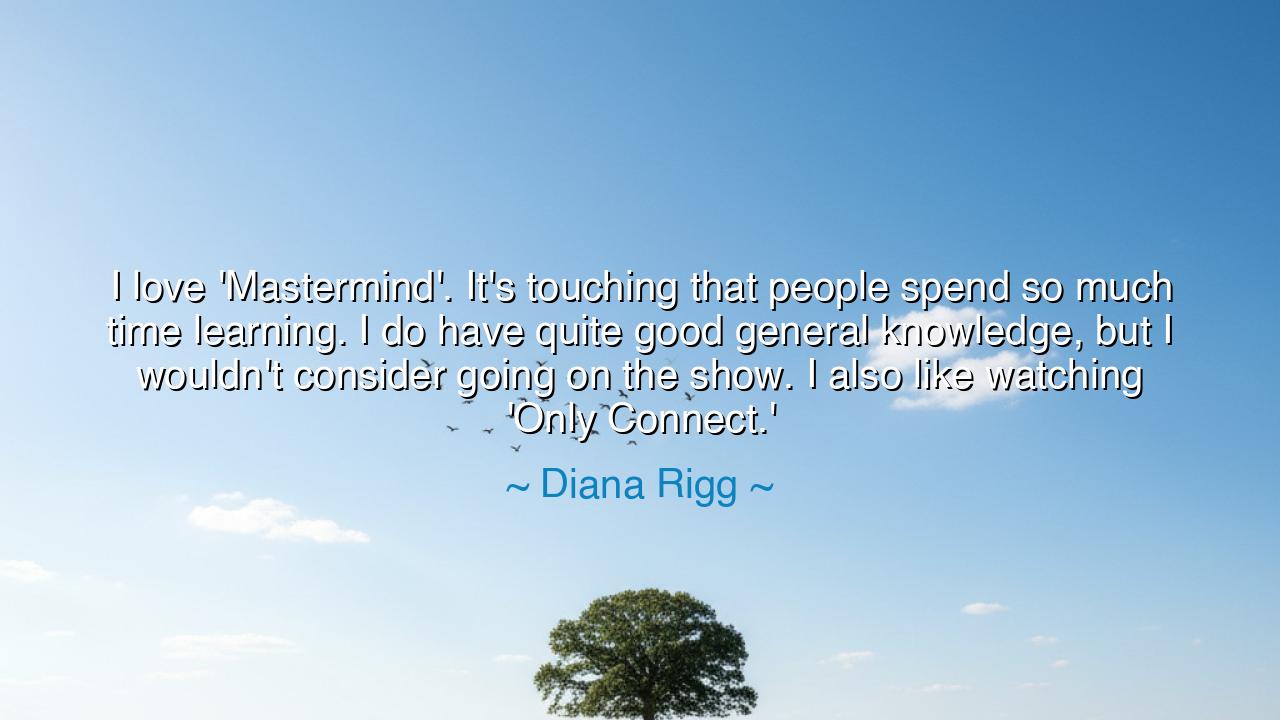
I love 'Mastermind'. It's touching that people spend so much time
I love 'Mastermind'. It's touching that people spend so much time learning. I do have quite good general knowledge, but I wouldn't consider going on the show. I also like watching 'Only Connect.'






The words of Dame Diana Rigg — “I love 'Mastermind'. It's touching that people spend so much time learning. I do have quite good general knowledge, but I wouldn't consider going on the show. I also like watching 'Only Connect.'” — reveal not merely her fondness for trivia or televised contests of intellect, but a deeper reverence for the pursuit of knowledge itself. In these gentle words, we hear the voice of an artist who spent her life in the realm of imagination, yet understood that wisdom, humility, and curiosity are the truest signs of an enlightened soul. To her, knowledge was not a trophy to be won, but a lifelong companionship, a noble journey that shapes both mind and spirit.
In this reflection, Rigg — one of the great actresses of her generation — honors the simple, human act of learning for its own sake. She finds beauty in the contestants of Mastermind, not because they display knowledge, but because they dedicate themselves to understanding, to exploring, to remembering. To her, their commitment is “touching,” for it represents something vanishing in the modern age: the love of learning untied to fame, wealth, or power. In the spirit of the ancients, she recognizes in these scholars and enthusiasts the sacred fire that once burned in the minds of philosophers, poets, and sages — a fire that seeks truth not for gain, but for the joy of knowing.
The humility in her statement — “I wouldn’t consider going on the show” — is equally profound. Though she acknowledges her own intellect and “quite good general knowledge,” she resists the vanity of proving it. This restraint is the mark of wisdom. For as the old philosophers taught, the wise do not parade their wisdom; they wear it lightly, knowing that true knowledge deepens humility, not pride. Socrates himself declared that he was the wisest man in Athens because he alone knew that he knew nothing. So too does Rigg’s modesty reveal her inner understanding: that the pursuit of wisdom is endless, and that those who boast of what they know have already ceased to learn.
Her affection for Only Connect, a game that celebrates not rote facts but the art of making connections, carries further meaning. In it, she sees the higher form of intelligence — not mere memorization, but insight: the ability to weave patterns, to recognize relationships, to perceive unity beneath diversity. This is the same principle that guided the ancient thinkers from Aristotle to Leonardo da Vinci, who believed that knowledge was not a pile of fragments, but a web of meaning. To “connect” is to bring the mind into harmony with the universe, to see how all things are bound together by invisible threads.
Rigg’s admiration for those who learn deeply and think widely speaks to her own artistic calling. As an actress, she inhabited countless lives, studied the motives of the heart, and gave voice to the timeless dramas of humanity. Her craft, too, was a form of learning — not of facts, but of empathy. Every role demanded understanding, every performance demanded connection. Thus, when she praises the learners and thinkers of the world, she is speaking from the same devotion that guided her on stage: the conviction that knowledge, in all its forms, is an act of love — love for truth, for humanity, for creation itself.
Consider the story of Hypatia of Alexandria, the philosopher and teacher who lived in the twilight of the ancient world. She too cherished learning as sacred and sought to unite science, mathematics, and philosophy into one radiant vision of truth. She taught freely to all who came, believing that knowledge ennobled the soul and preserved civilization. Like Diana Rigg admiring the devotion of others, Hypatia found beauty in the shared act of discovery. And though she was torn down by ignorance and fear, her spirit, like Rigg’s, continues to remind us that the pursuit of knowledge is itself an act of courage.
The lesson that flows from Rigg’s words is one of gentleness and strength: cherish learning not for applause, but for the quiet enrichment it brings. Study not to conquer, but to understand. Share what you know, but never stop seeking more. Whether through books, through nature, through art, or through compassion, keep alive the flame of curiosity — for it is that flame that keeps the human spirit young.
Therefore, let us honor her wisdom: let every day be a classroom, and every person a teacher. Let us admire those who dedicate themselves to the art of knowing, not as competitors, but as fellow travelers on the same endless path. For in the end, as Diana Rigg saw so clearly, the truest victory is not to win the game of knowledge, but to love the journey of learning — to be, always, a student of the world, humble before its mysteries, and inspired by its infinite connections.






AAdministratorAdministrator
Welcome, honored guests. Please leave a comment, we will respond soon